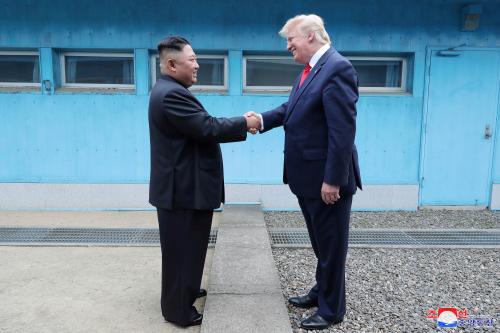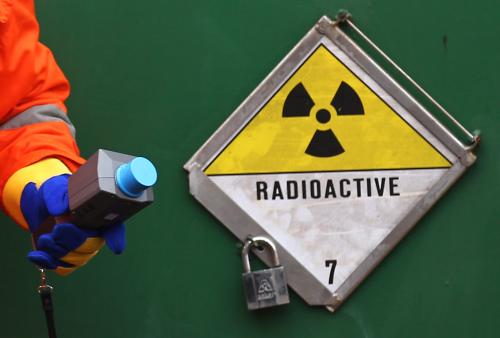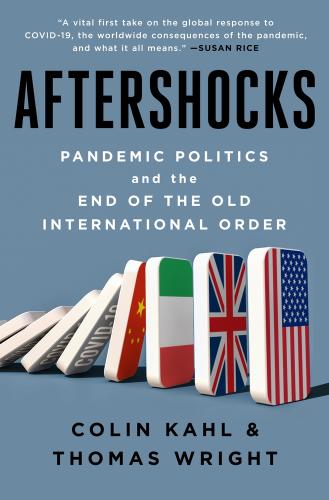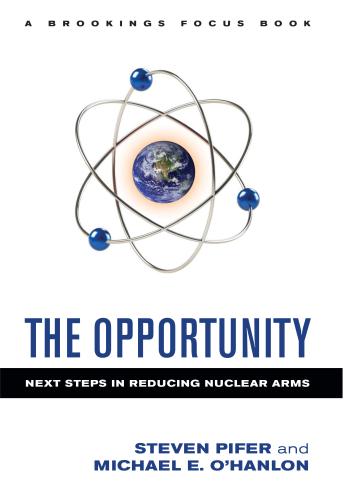Trump’s U.N. speech was one of the least effective, weakest, and indecisive ever given by an American president, argues Thomas Wright. It’s not that it failed against some arbitrary standard set by the foreign-policy establishment he despises. It failed on its own terms. And how it failed tells us something important about where his foreign policy is headed. This piece originally appeared in The Atlantic.
Above all else, President Donald Trump wants the world to see him as strong. He has repeatedly described himself as “militaristic,” and his cabinet as a group of “killers.” He relishes saying the supposedly unsayable. When he spoke at the U.N. General Assembly yesterday, he surely wanted his listeners to be awed by his toughness. Better, as Machiavelli said, to be feared than loved.
Trump’s team loaded his speech with harsh words and phrases. He promised to destroy North Korea if attacked. He called the Iran nuclear deal an embarrassment. He rejected globalism and spoke at length about the benefits of sovereignty, nationalism, and patriotism.
But when one moves beyond the image Trump tries to project and looks at the consequences of his words, things look quite different. His U.N. speech was one of the least effective, weakest, and indecisive ever given by an American president. It’s not that it failed against some arbitrary standard set by the foreign-policy establishment he despises. It failed on its own terms. And how it failed tells us something important about where his foreign policy is headed.
His U.N. speech was one of the least effective, weakest, and indecisive ever given by an American president.
According to multiple media reports, Trump is poised to refuse to certify that Iran is in compliance with the nuclear deal—the Joint Comprehensive Plan of Action (JCPOA)—against the advice of his cabinet. This would be Trump’s most momentous decision to date. It would immediately spark questions about whether decertification will lead to new sanctions and the collapse of the deal. It would spur a transatlantic crisis—all European nations, including Britain, have adamantly supported the JCPOA.
One would have thought that the U.N. speech would give Trump a chance to explain the necessity of de-certification. He could have shown why Iran is not in compliance. He could also have laid out what Iran needed to do to ensure certification. And he could have stated the strategy he proposed to pursue if he pulled out of the deal. But he did none of these things. Instead, he rattled off a list of Iranian provocations and aggressions in the Middle East, but said virtually nothing about its “non-compliance.” Instead, he charged that “the Iran deal was one of the worst and most one-sided transactions the United States has ever entered into. Frankly, that deal is an embarrassment to the United States, and I don’t think you’ve heard the last of it, believe me.”
Believe me? There was a time when the world took American leaders at their word. In 1962, at the height of the Cuban Missile Crisis, President John F. Kennedy dispatched Dean Acheson, the former secretary of state, to meet with Charles De Gaulle, the president of France. Acheson offered to share all U.S. intelligence on the Soviet missiles in Cuba. De Gaulle replied, “I don’t need to see pictures…the word of the president of the United States is good enough for me.”
What may have worked for Kennedy then does not work any more. For that, America can thank Iraq’s non-existent weapons of mass destruction. And it definitely will not work for a president with as flexible a relationship with the truth as Trump.
This speech was a gift to Iran because it hinted that the president of the United States has no case and no evidence. The day after the speech, Trump said he had decided on whether or not to certify the JCPOA, but would not yet reveal his decision. When he does so, he will not have prepared the nation or the world.
Trump always justifies his reticence to offer strategic details by saying he wants to preserve the element of surprise. This is a standard line of his since at least 1984, when he told a Washington Post reporter he had a secret plan to negotiate nuclear arms reductions with the Soviet Union that he could not reveal in the unlikely case he was asked to implement it. But, the penny is beginning to drop that, with Trump, there is no difference between unpredictability and indecisiveness. He does not know what he intends to do. So he feigns unpredictability.
The consequences of this indecisiveness and lack of preparation are real. If Trump does announce that Iran is no longer in compliance with the nuclear deal, he will then have to decide whether to re-impose sanctions on Iran. In a major speech to the American Enterprise Institute, Nikki Haley, his ambassador to the United Nations, said the administration would stay neutral on the issue and pass it over to Congress. Since the United States does virtually zero trade with Iran, Congress would face the challenge of either sanctioning non-American companies, including EU-based ones, who invest in or trade with Iran.
EU officials have made clear that they will oppose these sanctions. They are considering legislation to make it illegal for EU companies to comply with U.S. sanctions on Iran; they are also considering retaliatory measures. It’s not just the sanctions issue: If the deal collapsed and Iran resumed its nuclear program, the Trump administration would quickly have to decide whether to bomb Iran or not. If sanctions are not re-imposed or are neutered and the deal remains intact, Trump will look completely powerless. He will have de-certified the deal only to see it continue as if nothing happened.
Trump’s remarks on North Korea were even worse. He could have used his time to explain to a global audience why North Korea’s ballistic missile program is a threat to world peace. He could have shown how the Kim regime has repeatedly cheated on previous agreements. He could have made the case why Kim is not just seeking nuclear weapons to guarantee his own survival, but also actively seeks the breakup of the U.S. alliance with South Korea and the forced unification of the peninsula under his rule. Trump did none of this. He did not even mention Kim’s ICBMs, and why they are a game-changer. Instead, he focused on his undeniable repression at home. A legitimate topic, for sure—albeit one he dismissed on principle elsewhere in the speech—but not the actual reason for the present crisis.
Trump ensured that everything he said would be overshadowed by his promise to “destroy North Korea.” He could have said that if North Korea attacked the United States or its allies, America would bring Kim’s regime to an end. Instead, he threatened to destroy the country and its people, something entirely at odds with U.S. doctrine for many decades. He probably delighted in the audible gasps that comment produced in the room but it only allowed America’s rivals to draw an equivalence between the two leaders. It will play very badly in South Korea, and weaken popular support for the alliance with the United States. This phrase let Kim off the hook. Meanwhile, Trump said nothing about the consequences for Kim or China if North Korea acquires its ICBMs but does not use them.
Trump is now locked into a path where he keeps issuing bombastic, vague threats, but Kim keeps testing his weapons.
It’s hard to escape the conclusion that the threat to destroy North Korea was compensation for the fact that Trump has no idea what to do about the ICBM threat. He’s clearly frustrated that, based on the advice of the military and his secretary of defense, that a preventative strike is off the table. But that frustration is no excuse for a failure to educate the American people and the rest of the world about the nature of the North Korean threat, and to lead a conversation about how to respond appropriately. Trump is now locked into a path where he keeps issuing bombastic, vague threats, but Kim keeps testing his weapons. The American people are worried, but their president has not yet made a speech in which he explains the stakes and his strategy to deal with it. Ultimately, this leadership vacuum will present Kim Jong Un with strategic opportunities.
Russia was also a winner in Trump’s speech. In the past three years at the U.N. General Assembly, President Obama spoke at length about the Russian challenge. He was accused of not doing enough. But here was an American president speaking less than a year after a Russian attack on the United States—on American sovereignty and the democratic process—and he said absolutely nothing. No price would be paid. No red line would be drawn. It’s almost as if it never happened. The message to Russia—and other would be aggressors—is clear: The U.S. policy on political warfare is unilateral disarmament.
Trump was also largely silent on the geopolitical ambitions of Russia and China and the challenge each poses to the postwar U.S.-led international order. He did include one confused sentence in his speech that hinted at the Russian and Chinese challenge. “We must,” Trump said, “reject threats to sovereignty, from the Ukraine to the South China Sea.” No mention of Russia by name. No mention of China. Just a very vague expression of concern with the added insult of getting Ukraine’s name wrong (there is no “the”). This was fairly typical of how Trump treats Russia in his foreign policy speeches—a short, vague reference to its aggression, just enough so that no one can accuse him of completely ignoring it. Trump’s continued use of the word sovereignty and his criticism of past U.S. presidents for violating it was surely music to Vladimir Putin and Xi Jinping’s ears. They have long argued for an international order that “respects” their sovereignty as they define it: order organized around spheres of influence with a much smaller American role.
For the first eight months of Trump’s presidency, America’s allies have hugged him close because they know he responds positively to praise, and they hope to shape him. However, this tactical support is not a blank check. They cannot and will not support actions that they believe are not in their interest, especially when they doubt that there is any plan at all. Trump’s U.N. speech will have removed any lingering vestiges of hope they had that he is becoming more strategic or has a clear sense of how to tackle the most pressing threats and challenges facing America and its allies. As Trump nears an important decision on Iran and runs out of road on North Korea, he may find that his allies desert him when he acts.
Meanwhile, America’s rivals will take note. They are wary of Trump because he is erratic, indecisive, and commander-in-chief of the world’s strongest military. But they also understand that American power is more complex than military hardware. It also includes the skill of the president, strategic nous, and America’s unparalleled ability to build international coalitions. On all these counts, the weakness is beginning to show. The known unknown is whether and how they will exploit it.
The Brookings Institution is committed to quality, independence, and impact.
We are supported by a diverse array of funders. In line with our values and policies, each Brookings publication represents the sole views of its author(s).










Commentary
Trump’s indecisive, ill-prepared debut at the United Nations
September 21, 2017